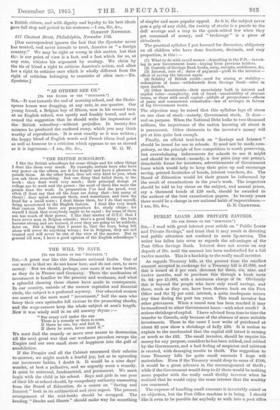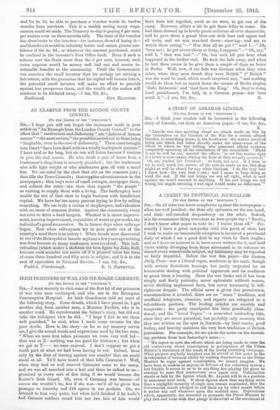PUBLIC LOANS AND PRIVATE SAVINGS.
[TO. THE EDITOR Or TER " SPECTATOR.") Sm,—I read with great interest your article on "Public Loans and Private Savings," and trust that it may .result in directing real public attention not confined , to mere lip-service. The writer has fallen into error as regards the advantages of the Post Office Savings Bank. Interest does not accrue' on any deposit of 20s. until the amount has been undisturbed for a full twelve Months. This is a hardship to the really small investor.
As regards Treasury bills, at the present time the smallest amount accepted in exchange for a, treasury bill is £1,000, and this is issued at 5 per cent. discount for three, six, nine. an3 twelve months, and to purchase this through a bank costs 2s. 6d. per £1,000, with a minimum charge of Ss. Obviously this is beyond the people 'who have only small savings, and these, such as they are, have been thrown back on the • Post Office and the 21 per cent. interest, a quite inadequate return any time during the past ten years. This small investor has other grievances. When a round sum has been reached it may be transferred to other Government loans—with what result ? A serious shrinkage of capital. I have advised from time to time the transfer to Consols, only because of the absence of more suitable investments. Those in the cases I now write of purchased at about 82 now show a shrinkage of fully £20. It is useless to explain to the uneducated that the capital still intact is earning as much as the £82. The small investor; should he require his money for any purpose, considers he has been robbed, and robbed by the Government, and a bad feeling of suspicion and mistrust is created, with damaging results to thrift. The suggestion to issue Treasury bills for quite small amounts I hope will materialize. Even if the Treasury would drop to sums of £100, it would be a great advance in the encouragement of thrift ; while if the Government would drop to £1 there would be nothing more popular with the really small thrifty investor when he realized that he would enjoy the same interest that the wealthy can command.
The expense of handling small amounts is invariably raised as an objection, but the Post Office machine is in being. I should like it even to be possible for anybody to walk into a post office and for 4s. 9d. be able to purchase a voucher worth 5s. twelve months from purchase. This is a weekly saving many wage- earners could set aside. The Treasury to-day is paying 6 per cent. per annum even on three months bills. The issue of the voucher has drawbacks to the investor—for instance, dread of losing h- and therefore it would be infinitely better and ensure greater con- fidence if the 4s. 9d., or whatever the amount purchased, could be credited in the investor's Post Office book. Even if such a scheme cost the State more than the 5 per cent. interest, such extra expense would be money well laid out and secure in- estimable benefits to the community. Until the Government can convince the small investor that his savings are earning a fair return, with the guarantee that his capital will remain intact, the potential small investor will make no effort to provide against less prosperous times, and the wealth of the nation will continue to be frittered away.—I am, Sir, &c.,



































 Previous page
Previous page